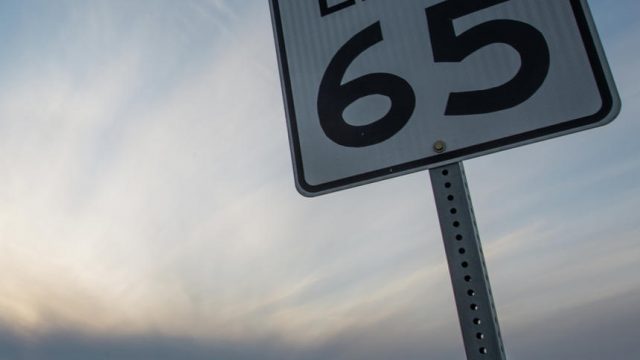North Dakota Is Third Lowest in the Nation When It Comes to Speeding Tickets Per Capita

The speed limit changes from 45 miles per hour to 65 miles per hour near Ardoch, ND on Friday, March 10, 2017. (Joshua Komer / Grand Forks Herald)
According to data put together by (checks link) a Honda dealership in Yonkers (yeah, beats me), North Dakota had the third lowest rate of speeding tickets in the nation as measured per 10,000 citizens.
The methodology was pretty simple. “[W]e were able to get at least one year of speeding ticket data from between 2011-2017 for 48 of the 50 states (Arkansas and Louisiana proved too elusive), and for most of them, we were able to find and compare that data across multiple years in our time frame,” they write.
Here’s their list of the least ticket-happy states, but go read the whole article:
There are some problems with their process.
For one, they’re not comparing the same year in every state. North Dakota’s ticketing data comes from 2016. For other states the data comes from another year in their range.
For another, I think putting the speeding tickets in the context of licensed drivers or perhaps vehicle miles traveled would be a better measurement. Many states may have large factions of their populations who do not drive based on factors like age and urban density. These factions would skew per-capita ticketing rates.
But, those limitations in mind, it doesn’t surprise me at all that North Dakota is near the bottom of the list when it comes to the rate of tickets issued.
I have a couple of theories for why that is, and they have to do with financial incentives.
[mks_pullquote align=”left” width=”300″ size=”24″ bg_color=”#ffffff” txt_color=”#000000″]…in the near future local governments will be able to create for themselves a fiscal incentive to write more tickets. Which probably means North Dakota’s days at the bottom of this list are numbered.[/mks_pullquote]
North Dakota’s speeding fines are hilariously low. Which means speeding tickets in our state simply don’t produce that much revenue, at least compared to other states.
Also, there’s political little incentive to use speeding enforcement as a way to raise revenue, because by law those fines go into the Common Schools Trust Fund when levied by state and county law enforcement.
Article IX, Section 2 of the North Dakota Constitution states that “all fines and fees for violation of state laws . . . must be faithfully used and applied each year for the benefit of the common schools of the state and no part of the fund must ever be diverted even temporarily, from this purpose or used for any purpose other than the maintenance of common schools as provided by law.”
Section 29-27-02.1 of the North Dakota Century Code builds on this requirement, stating “all statutory fees, fines, forfeitures, and pecuniary penalties prescribed for a violation of state laws, when collected, must be paid into the treasury of the proper county to be added to the state school fund.”
While municipalities can keep the revenues from the tickets their cops write – section 40-11-13 of the NDCC states any fines resulting from the violation of municipal ordinance be “paid into the city’s treasury” – they also can’t raise their fines above the state’s, again, hilariously low levels.
Or they couldn’t raise their fines. This legislative session lawmakers passed SB2304 which allows locals to jack up their fines for traffic tickets above state levels.
I suspect that law will eventually be the subject of litigation – can we really base the punishment for a crime based on the uniform the cop who wrote you the ticket is wearing? – but in the near future local governments will be able to create for themselves a fiscal incentive to write more tickets.
Which probably means North Dakota’s days at the bottom of this list are numbered.
I do think North Dakota’s fines for speeding should be raised. I think we need to do whatever we can, however, to avoid creating financial incentives for certain types of policing. All revenues from traffic fines at all levels of government should go into the Common Schools Trust Fund, or a similar fund (maybe funding for driver’s education programs?), to ensure the cops are policing for public safety instead of capturing revenue from fines.





